Want to know more about how Fujitsu can help you achieve your sustainable transformation?
How Mars has reimagined digital delivery for a hyper-complex world

Romain Apert, the CIO at confectionery giant Mars Wrigley, shares the creative thinking behind Mars’s approach to solving dynamic business challenges with digital innovation. by James Lawrence
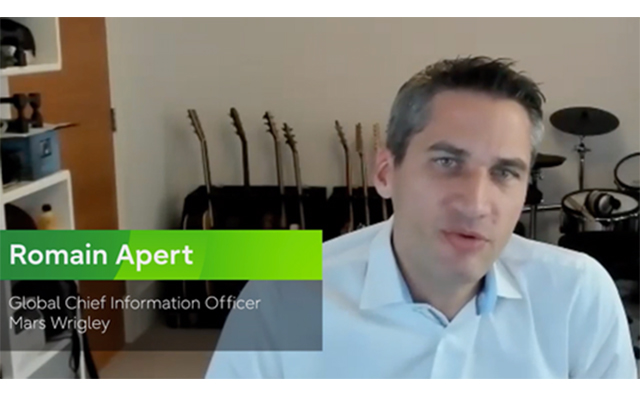
“We have seen a shift from a world that is complicated to one that is complex.” On the surface, that observation from Romain Apert, global CIO of market-leading confectionery giant Mars Wrigley, may seem a subtle distinction. But the implications of that shift have informed a major transformation right across the wider Mars group as to how it identifies and delivers digital solutions to today’s dynamic business challenges. “A complicated world is one where things might not be easy, but most of the information you need [to address that] is there in front of you,” explains Apert. “However, when you are dealing with a complex environment, you have to contend with lots of very uncertain information.”
Watch Mars Wrigley’s Romain Apert exploring the role digital innovation is playing in delivering sustainable manufacturing.
He underscores the point with an analogy. “In a complicated situation, having a North Star [a fixed point that allows you to navigate to your chosen destination] is useful, because that star is going to be in the same place by the time you implement a project that may have taken a number of years. But when you have a truly complex situation, you’re dealing with shooting stars.”
“Halloween is a make-or-break season for us in terms of sales performance. So we needed to try everything we could to save it.”
Mars’s response to such fast-moving unpredictability is what Apert describes as “a culture of reinforcement learning” coupled with an “exploration mindset.”

In practice, that means teams of problem-solvers starting with first-hand observations that lead, through a process of continuous testing and iteration, to a set of key beliefs and solutions. This is very different from the “exploitation mindset,” typically used in the global consumer packaged goods (CPG) sector, says Apert, which starts with the key beliefs and follows the opposite path.
The power of the Mars Digital Engine
The real-world application of this philosophy within Mars — at its confectionery, petcare, veterinary services and food businesses — is the Mars Digital Engine, the company’s agile system for rapidly developing and deploying innovative digital solutions.
“Step two,” he continues, “is to solve the problem using data and digital technologies — whether traditional ones, or advanced technologies such as AI. We typically do this over a 12-week period and emerge with a minimum viable product so we are in a position to pressure test that work and refine it based on user feedback.”
Then, after multiple iterations, the team is able to progress to step three: automating the solution, which frees up time to work on subsequent challenges.
How Mars Wrigley saved Halloween
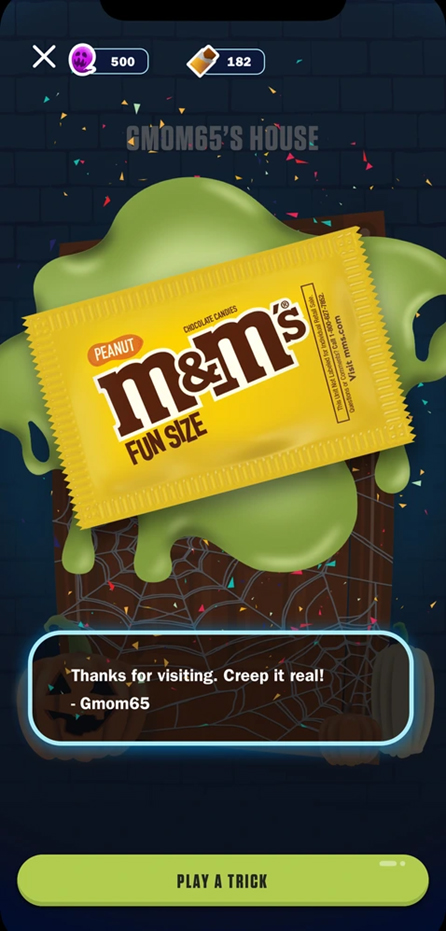 Mars: ‘Creeping it real’
Mars: ‘Creeping it real’
This tried-and-tested methodology led to Mars Wrigley solving a daunting problem that was looming on the horizon in the second quarter of 2020, as the full force of the COVID-19 pandemic started to bite.
Due to social distancing restrictions, the popular Halloween tradition of trick-or-treating that comes around every October 31 was under threat of being banned or at least discouraged. With that, the huge spike in seasonal candy sales that occurs in the build-up to the celebration was likely to disappear.
On April 24, the challenge came to Apert’s door when he was asked by a colleague: What could be done to save Halloween by digitizing the event?
To Apert’s surprise, few if anyone in the company — or even in the wider confectionery industry — had seriously considered how to apply digital and virtual elements to the Halloween experience before, even pre-COVID-19. But this was an opportunity to change that, possibility permanently, and learn lessons for other events in the candy-giving calendar.
“Halloween is a make-or-break season for us in terms of sales performance,” says Apert. “So we needed to try everything we could to save it.” Faced with a daunting hard deadline, he progressed that ambition by turning to the Mars Digital Engine.
It led to a multi-part, highly interactive and fun app that would enable those celebrating Halloween to enjoy a ‘virtual trick-or-treat experience’ — and an experience very much aligned to the Mars Wrigley ethos of creating “better moments that make the world smile.”
Within weeks, the small, agile project team had a prototype of the digital Halloween app up and running. And after several rounds of user testing, it was launched to the US public as Treat Town on October 1.
The scope was impressive. “You could create your own avatar, decorate your front door online, put it on a map with a geofencing capability, then add families and friends who you wanted to trick or treat, not just within your local neighborhood but across the entire United States,” Apert explains. To gain treats, users were gifted credits by people they visited virtually — which could be redeemed at retailers across the US for some of the brand’s most iconic candies such as M&Ms, Snickers or Skittles.
The result was a resounding success. By Halloween itself, more than half a million consumers had downloaded the app from the Apple App Store or Google Play, with many others engaging through the Treat Town microsite. And the project generated publicity on a scale that Apert equates to a Super Bowl advertising campaign in terms of the PR impressions.
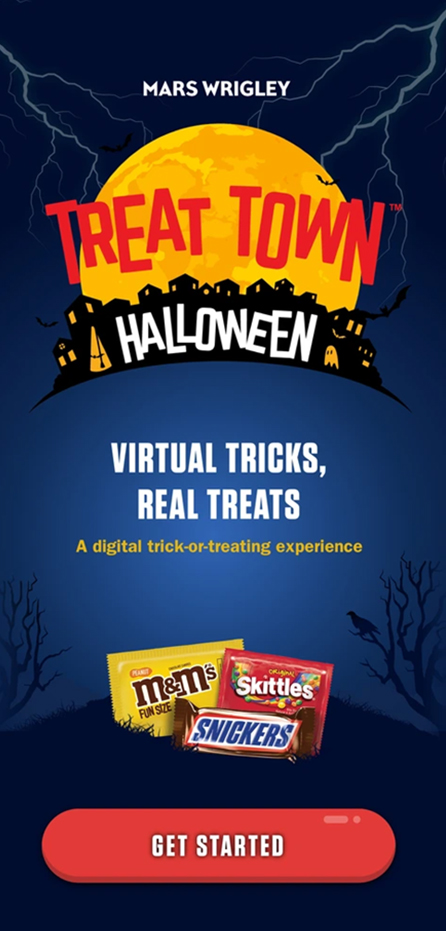 Mars: Saving Halloween
Mars: Saving Halloween
“We had never done anything like this before,” he says. “So it was both scary and exciting. My expectation at the outset was that we’d stop at some point and acknowledge we’d taken it as far as we could and see it as a learning experience that would be useful for an actual launch in 2021. But with the scale of the impact of the pandemic, we just had to find something for Halloween 2020 that created an element of magic.”
The success of that project has since inspired thinking of how similar online experiences can be created for other confectionery gifting dates, such as Mother’s Day and Valentine’s Day.
Transforming trade in China
Given the pedigree of the Mars Digital Engine, perhaps the speed and success of the Treat Town project should have come as no surprise. “We have more than 75 use cases where we have deployed this methodology,” says Apert, pointing to another standout example from two years ago in the gigantic Chinese market.
Given the pedigree of the Mars Digital Engine, perhaps the speed and success of the Treat Town project should have come as no surprise. “We have more than 75 use cases where we have deployed this methodology,” says Apert, pointing to another standout example from two years ago in the gigantic Chinese market.
“We decided to take a user-centric approach to the whole ‘traditional’ trade channel,” he says. “We interviewed more than 50 sales representatives to understand their pain points, as well as distributors and store owners.”
“We had never done anything like this before, so it was both scary and exciting. But with the scale of the impact of the pandemic, we just had to find something for Halloween that created an element of magic.”
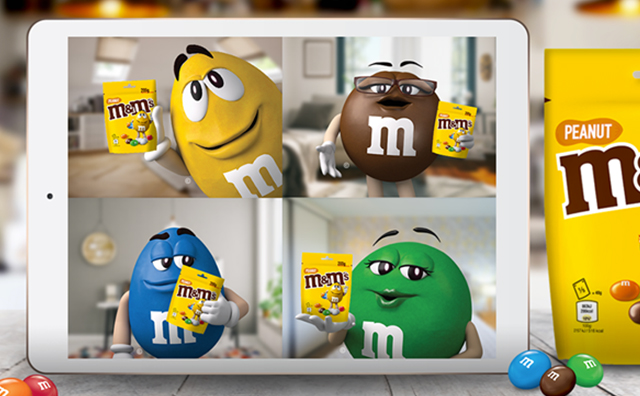 Virtual meet and treat
Virtual meet and treat
One of the key findings was that the sales reps were spending the majority of their time on fulfillment rather than actually selling product, due to the analog nature of the ordering process. “So we saw this as an amazing opportunity to begin to digitize the trade channel and create a competitive advantage,” says Apert.
The outcome was the development of an ordering application that exploited the ubiquity of China’s leading mobile messaging and payment service app. “We used this so we didn’t need to do any training or issue any devices, as everyone in China has it,” says Apert.
The Mars Wrigley app, which uses simple technology, allows store owners to create orders that go directly to distributors, who then send the products straight to the stores, without having to involve the sales team. “That means our sales reps can now spend the majority of their time selling our products and talking about our category leadership,” says Apert.
Although Apert is proud of the app itself, it is the conditions which led to its development, and the transformation that it has brought about, that excites him the most. “I love new technology, such as AI, but the technology here wasn’t the competitive advantage,” he says. “The starting position was user-centricity — spending time to listen to our end-users and use that as a way to transform. It all comes back to talent and mindset.”
The system has now been deployed to more than 700,000 store owners, and Mars Wrigley is constantly adding functionality to it in a process of continuous improvement.
Partnering for success
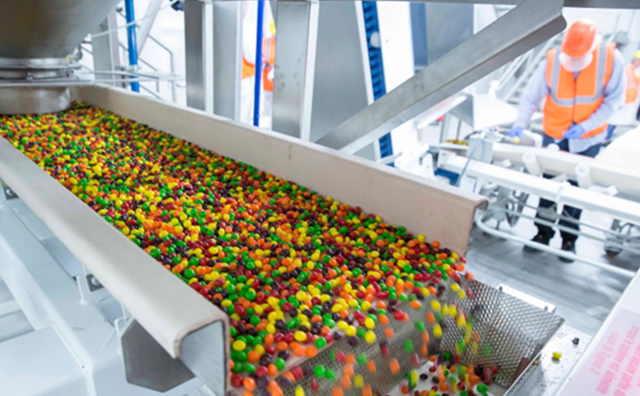
This approach to rapid problem-solving extends to the way Mars leverages its relationships with partners, which Apert sees as increasingly vital for success both now and in the future. “The world is moving so fast,” he says, “you have to surround yourself with partners that bring you a new perspective and can share insights into innovation. You just can’t manage your own learning agenda at a rapid enough pace.”
One such example is the way Mars Wrigley is in the process of transforming its supply chain capabilities, and is partnering with digital transformation giant Fujitsu to help deliver the core applications that will underpin this. “Supply chain digitization is a major topic for most CPG businesses, including Mars, and we have a big program with big ambitions where Fujitsu has an important role to play,” says Apert.
Specifically, Apert’s team is working on a pilot to provide enhanced order management (OM) to small and medium-sized customers in the US by deploying the cloud-hosted Fujitsu GLOVIA OM solution. This comes in response to yet another user-centric initiative under the Mars Digital Engine umbrella.
“We realized that the experience of these customers when ordering products, via email or even by fax, was just not living up to any kind of modern standard,” says Apert. “So we used that opportunity to look at how digital technology could bring an augmented experience to them through us delivering world-class solutions.”
“The world is moving so fast, you just can’t manage your own learning agenda rapidly enough. You have to surround yourself with partners that share new perspectives and insights into innovation.”
While Apert is certainly enthusiastic about the direction of this project, and the many solutions that have emerged from the Mars Digital Engine, it is the methodology behind it that he is most proud of. He is particularly pleased by the way the exploration mindset has become embedded throughout the organization, creating a broad understanding of how business value can be identified and delivered.
And, above all, that requires an adaptive leadership approach which he sees as key to his role as a transformative CIO. “Leading in a complex environment, you need to create a team that is empowered, autonomous, individually skilled and collectively diverse. And you need to work for them,” he says. “So the organization is almost upside down. You’re no longer there to steer the team, instead you need to remove barriers so they can move as quickly as possible. My role is to create the conditions for success.”
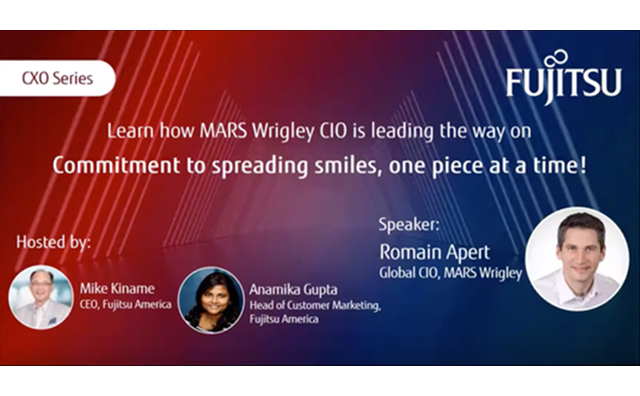
Watch Mars Wrigley’s Romain Apert talking in detail about Design Thinking, Mars Digital Engine, Treat Town and more as part of the Fujitsu CxO Webinar Series.








